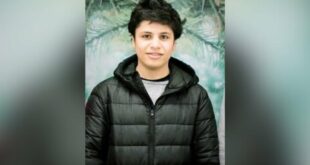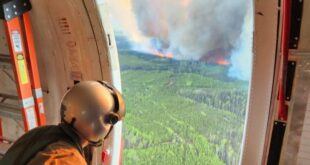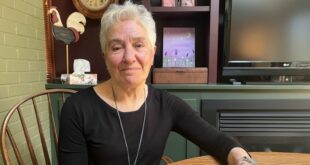After a quarter century on the map, Nunavut youth are left with feelings of hope, disappointment

Nunavut redesigned Canada's map when it officially became a territory on April 1, 1999.
Covering 2 million square kilometres and a fifth of the country, the creation of Nunavut ultimately gave the territory's Inuit control of their future.
But 25 years of Nunavut has since left some with feelings of both hope and disappointment, especially for the new generation that has emerged since the territory was created.
Born shortly after the spring solstice in 1999, Eva Muckpah is part of a group of Nunavummiut who have grown up alongside the territory itself.
Muckpah is studying to be a social worker at Nunavut Arctic College — a job desperately needed in a territory with a severe shortage of Inuit social workers.
"Hopefully in the future, there'll be more Inuit in the services so that they know and understand what the families are going through," Muckpah said.
For Premier P.J. Akeeagok, the younger generation in Nunavut is one of the territory's greatest strengths.
"I see so much optimism and so much hope when I see the youth that are pursuing their dreams," Akeeagok said.
A territory in its prime
Not only is Nunavut the youngest member of Canada's Confederation, it's also the youngest demographically speaking. Around one in two people living in the territory are under the age of 25, according to the most recent census data.
Akeeagok embodies this reality himself, having been chosen as premier at the age of 37, making him the youngest in the role in Canada at the time.
Twenty years earlier, Nunavut's first premier Paul Okalik had broken a similar record when he was elected at the age of 34.
Today, Akeeagok says the time of Nunavut being looked upon as a young territory is slowly fading.
"I believe we've gone through that initial stage of the growth," he said, comparing the territory to "an igloo being built."
"You need to have a solid foundation, to ensure that, by the time you get to the top, it will withstand the different pressures, whether they're positive, or the challenges that we face as a territory."
Broken promises
Akeeagok's sense of optimism about the territory isn't exactly shared by the younger generation. Many young Nunavummiut say they have lost confidence in public institutions because of Nunavut's persistent challenges.
"I feel that our people have been failed by the government multiple times," said Julia Angoo, also a social work student at Nunavut Arctic College.
"I feel that our people have taken too many broken promises from the government."
Angoo notes, among other things, the territory's housing crisis, food insecurity and addiction issues fuelled by intergenerational trauma.
Overcrowded housing, which continues to affect one in two Inuit, is a challenge with rippling effects. It damages mental and physical health, according to the federal housing advocate in a November 2023 report.
As of Sept. 30, the wait list for public housing was 3,305 people long, according to the Nunavut Housing Corp.
"How is anybody expected to thrive if they don't have proper housing and if they don't have food security?" said Derek Irwin, an environmental technology student.
"You can't focus on education," Irwin said. "You're only focused on survival."
"I think Nunavut's biggest step is to get housing secured and food security," he added.
The territory's long-standing dependence on Ottawa also complicates its future, since approximately 80 per cent of Nunavut's revenues come from federal transfers.
Akeeagok said his government is well-aware of these issues and he has made them his priority.
"There's really so many challenges that are there, but I always see things very optimistically and from a positive viewpoint," he said.
Projects in progress
Despite its challenges, Akeeagok believes Nunavut is headed in the right direction.
In October 2022, his government launched Nunavut 3,000, which aims to build 3,000 new homes in the territory by 2030.
In an email to Radio-Canada, the Nunavut Housing Corp. said 151 housing projects were completed in 2022, and 119 in 2023. From now until the end of 2024, another 152 new builds are expected.
Nunavut's future recovery centre, Aqqusariaq, is also supposed to respond to the territory's pressing needs in terms of addiction and trauma treatment.
Once built, the facility will provide treatment based on Inuit values and culture, including healing programs on the land in Iqaluit and in other communities.
"I believe good outcomes will come from this," Angoo said.
Full control
In January, Nunavut and Canada signed a long-awaited devolution agreement to return control of lands and resources from the federal government to the territory.
The transfer, which will officially take place in three years, is the culmination of years of negotiation between Ottawa and Nunavut.
Jeffrey Maurice, the senior advisor for Nunavut's Devolution Secretariat, said devolution was "a big piece in terms of coming to fruition as a territory." He also noted the job opportunities it will create for the younger generation.
"Nunavut will now have more autonomy in terms of its making decisions and natural resources within the territory," Maurice said.
Irwin is also confident when he visualizes the future of the territory.
The 25-year-old student, the same age as the territory, believes Nunavut rests in the hands of his generation. He also said his territory will always be considered the country's youngest.
"I don't know if it will stop being labelled as a young territory. A lot of the population is very young and I think it'll continue to be young for a long time," Irwin said.
"Youth are at the forefront of this change and evolution."
*****
Credit belongs to : www.cbc.ca
 MaharlikaNews | Canada Leading Online Filipino Newspaper Portal The No. 1 most engaged information website for Filipino – Canadian in Canada. MaharlikaNews.com received almost a quarter a million visitors in 2020.
MaharlikaNews | Canada Leading Online Filipino Newspaper Portal The No. 1 most engaged information website for Filipino – Canadian in Canada. MaharlikaNews.com received almost a quarter a million visitors in 2020.






